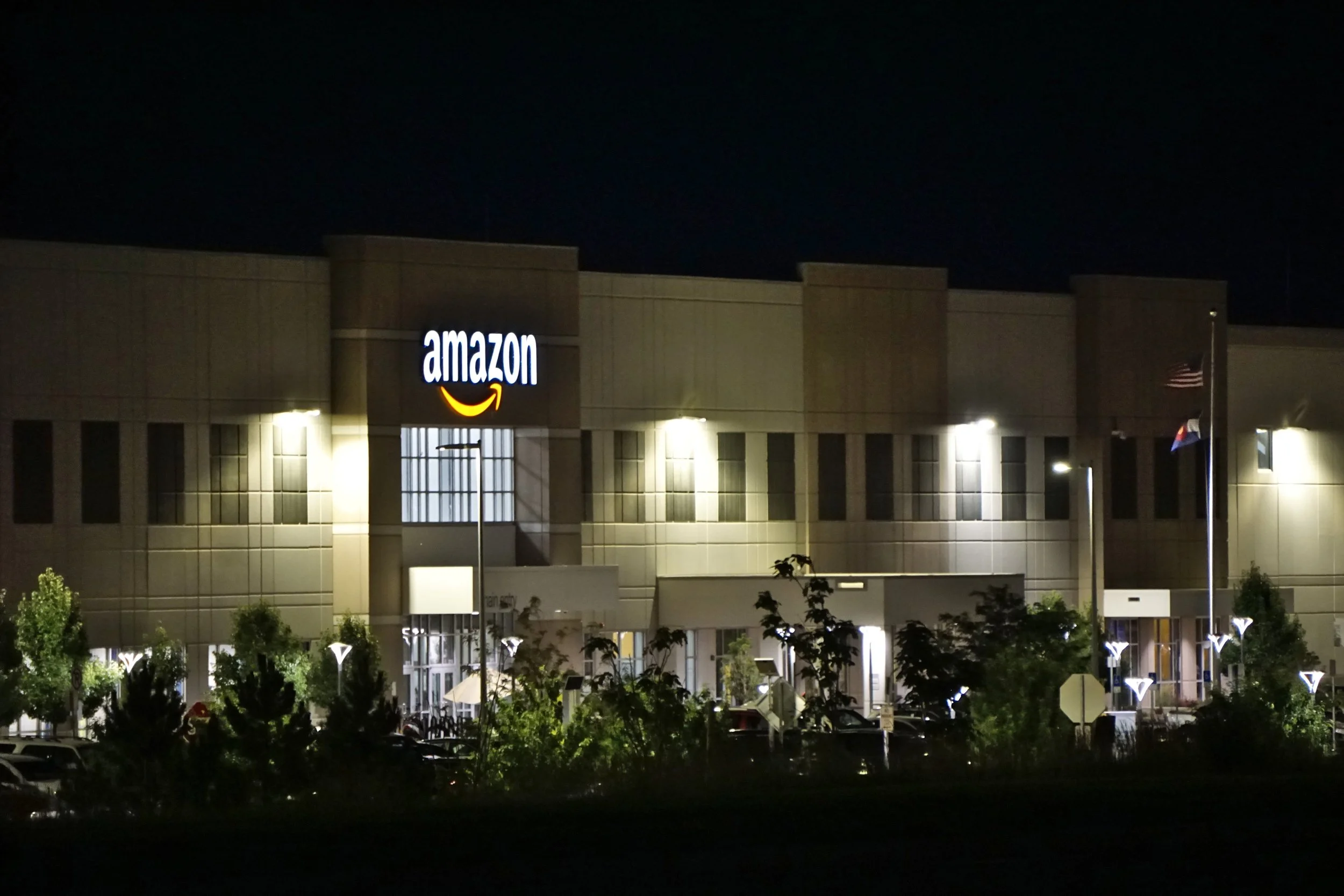📦 Amazons Advanced Milestone
Good morning! Welcome to a special edition of our Supply Chain and Logistics Newsletter, dedicated to National Moon and Space Exploration Day! Today, we commemorate a historic milestone in human achievement—the landing of Apollo 11 on the lunar surface. As we celebrate this momentous occasion, we reflect on the incredible role that supply chain management and logistics played in enabling this extraordinary feat.
Happy National Moon and Space Exploration Day! 🌕🚀
———————————
Amazon has announced a significant milestone in its sustainability journey, reporting a decrease in greenhouse gas emissions for the first time since the introduction of its climate pledge in 2019. According to the organization's recent sustainability report, carbon emissions fell by 0.4% from 71.54 million metric tons in 2021 to 71.27 million metric tons in 2022. This marks a positive shift after Amazon's emissions increased by more than 20 million metric tons between 2019 and 2021.
To achieve this reduction, Amazon has been analyzing different delivery routes in an effort to expedite package delivery and subsequently reduce carbon emissions. The company also shared its plans to introduce 100,000 Rivian electric delivery vehicles by 2030, with thousands already in operation. These efforts reflect Amazon's commitment to long-term sustainability, acknowledging that there is more work to be done and emphasizing the absence of shortcuts or quick fixes.
Check out today’s featured article from Supply Chain Brain to find out if there will be more milestones reached by Amazon in the near future. Will their plan to introduce 100,000 EV vehicles by 2030 be achieved?
Featured Article:
Amazon Reports First Drop in Its Greenhouse Gas Emissions | Supply Chain Brain
“Amazon reported its first decrease in greenhouse gas emissions since the company introduced its climate pledge in 2019 to reduce carbon outputs.”
Electric Vehicles & Fuel Tech
Corvus Energy Introduces Corvus Pelican Fuel Cell System for Extended Zero-Emission Operations in Marine Vessels
Corvus Energy has recently announced its partnership with Toyota to develop the Corvus Pelican Fuel Cell System (FCS) for marine applications. The system combines Toyota's proven fuel cell technology with a safe and advanced design, making it an ideal range extender for near-shore and short-sea vessels. The Corvus Pelican FCS enables vessels to achieve longer durations of zero-emission operations, surpassing what can be achieved with battery power alone. By integrating green fuels, such as hydrogen, with the fuel cell system, vessels can extend their zero-emission range without the need for frequent refueling or recharging.
When used in conjunction with battery energy storage and hydrogen as a fuel source, marine fuel cell systems provide the ability to operate at zero emissions for an extended period. This technology is up-and-coming for cruise ships, which can leverage hydrogen fuel tanks to power the fuel cell technology and eliminate the need for battery charging installations. Moreover, vessels capable of operating on zero emissions will be well-positioned to meet increasing regulations in ports and areas where zero-emission transits will be required. The Corvus Pelican FCS has a wide range of applications and can be utilized as the primary or auxiliary power source for various vessel types, including container feeder vessels, service operation vessels, platform supply vessels, Ro/Ro-Pax vessels, ferries, tugboats, smaller cruise vessels, and coastal/regional transport ships. The product launch occurred during the Nor-Shipping exhibition in June, where Geir Bjørkeli, CEO of Corvus Energy, highlighted the significance of hydrogen as a clean energy solution for shorter and medium-distance routes.
Law & Trucking
Trucking Industry Faces Rising Litigation and Soaring Verdicts, Despite Improved Safety
According to a study by the U.S. Chamber of Commerce Institute for Legal Reform, the trucking industry in America is facing a significant increase in litigation, with verdicts and settlements in trucking accident cases reaching unprecedented levels. The study reviewed 154 trucking litigation verdicts and settlements from June 2020 to April 2023 and found that the mean plaintiffs' award was $27.5 million, with a median award of $759,875 for settlements. Interestingly, this surge in litigation occurred despite a decline in the rate of fatal trucking crashes. The study revealed that between 2000 and 2020, the rate of fatal crashes involving trucks decreased by 34.4%. This discrepancy between improved safety and increasing verdict sizes highlights a concerning problem within the industry.
Nathan Morris, the senior vice president of legal reform advocacy at the institute, emphasized that litigation excesses have far-reaching consequences beyond the courtroom, affecting consumers nationwide when verdicts are not in line with actual liability. Some states, like Texas, have implemented regulatory reforms to address this issue, but there is still work to be done. One worrying trend identified in the study is that some trucking fleets are reducing their insurance coverage as insurance costs rise. This decision can have severe long-term financial implications for carriers. The study urged trucking companies and insurers to consider both mean and median numbers in their risk analysis, as extraordinary high-dollar verdicts and settlements persist despite the industry's improved public perception.
Let’s Get Global 🌎
Checking out the scoop outside of the United States…
🪧 Canadian West Coast port workers restart strike. Longshore workers in Canada have resumed their strike after a union division rejected a tentative deal with maritime employers, which had temporarily ended a 13-day work stoppage earlier this month. The International Longshore and Warehouse Union (ILWU) Canada's longshore caucus voted against the settlement proposed by federal mediators, citing concerns about the cost of living, work jurisdiction, and the length of the contract. ILWU Canada President Rob Ashton expressed dissatisfaction with the proposed collective agreement, stating that it was too long given the uncertain times. As a result of the rejection, the union's longshore division returned to the picket line on Tuesday afternoon.
🌍 Global Logistics Market Projected to Surpass $16 Trillion by 2032. According to a recent report by Allied Market Research, the global logistics market is projected to exceed $16.79 trillion by 2032, with a compound annual growth rate (CAGR) of 5.6% from 2023 to 2032. The growth of the logistics industry will be driven by factors such as the expansion of e-commerce, increased reverse logistics operations, and the implementation of trade-related agreements. Technological advancements, including tech-driven logistics services, IoT-enabled devices, last-mile deliveries, and logistics automation, will further contribute to the sector's expansion. However, challenges such as a lack of control over manufacturers, inadequate infrastructure, and higher costs could hinder the market's growth. The report analyzed the logistics market across 17 countries and involved interviews with more than 200 logistics professionals.
iLevel With You 🏡
More topics for the average American household to consider…
🌧️ Private Investment Urgently Needed as Natural Disasters Threaten U.S. Food Supply Chains. The U.S. food and agriculture sector is facing challenges from the pandemic and natural disasters, which have caused disruptions in the food supply chain. Natural disasters are increasing in frequency and severity due to climate change, resulting in economic losses and impacting essential crop production. Severe winter storms and historic flooding in California have led to potential crop losses and limited availability of crops like cotton, strawberries, leafy greens, and tomatoes. The arrival of El Niño could further worsen the situation with power-grid blackouts, flooding, drought, and wildfires affecting crop growth. Private-sector companies, such as generator manufacturers, flood control companies, and engineering firms, play a crucial role in mitigating the risks and providing solutions during natural disasters. Supporting these companies is essential for prevention and recovery efforts in the face of ongoing natural disasters.
💪🏼 Inflationary Pressure on Supply Chains: Strategies for Mitigation. Navigating the inflationary pressures impacting the freight industry requires addressing long-standing inefficiencies and embracing technological advancements. Factors such as the lingering effects of the pandemic, fiscal policies, and price hikes by corporations contribute to increased costs and decreased profitability for shippers and carriers. Inflation exacerbates these challenges by reducing consumer spending and demand for transportation services. Manual processes, lack of data visibility, and outdated practices further hinder the industry's ability to mitigate inflation's impact. Embracing digital transformation, including technologies like freight consolidation, distribution optimization, AI customer service, and data-driven solutions, can help reduce costs, improve operational efficiency, and provide better control over expenses.
⛽️ Will Cleaner Diesel Trucks Have Relevance in a ZEV World? Allen Schaeffer, the executive director of the Diesel Technology Forum (DTF), is involved in the ongoing discussions surrounding the future powertrain of trucks. While the California Air Resources Board (CARB) has been pushing for zero-emission vehicles (ZEVs), the DTF sees diesel engines as playing a leading role in a cleaner future. The DTF recently released a study on the growing number of near-zero-emission vehicles (NZEVs), which showed a slight increase in trucks meeting the criteria. However, in California's vision of a ZEV-only trucking sector, NZEVs don't exist. Schaeffer acknowledges California's leadership but questions whether the supportive infrastructure and ecosystem needed for a ZEV transition will be available outside the state.
Get Smart 🧠
Ramp up that brain power for these advanced topics…
🚚 Yellow Bankruptcy: Implications for Real-Time Supply Chain Disruptions. Yellow Corp. has failed to make its required pension contributions, jeopardizing the pension funds, pension accruals, and health care coverage for its workers. The Teamsters union has threatened to strike if the default is not resolved, which could potentially lead to the end of the company. Yellow's management likely knew the risks of not paying into the pension fund and may have been hoping for a government bailout. Customers are advised to consider alternative shipping options as a shutdown could result in significant disruptions and delays in freight movement. If a strike occurs, Yellow's revenue would plummet, making a recovery unlikely without a bailout. The trucking industry is currently weak, with abundant capacity, so competitors could absorb the volume if Yellow shuts down. However, market volatility and disruptions in the freight network are expected.
📉 Predictions of Supply Chain Shock Multiply as UPS Strike Looms. As the strike deadline for Teamsters at UPS Inc. approaches, predictions of supply chain shock and growing severity are emerging. With about 340,000 workers potentially going on strike, concerns are mounting about the impact on the supply chain, which has only just recovered from the pandemic. Competitors like FedEx and the U.S. Postal Service do not have the capacity to absorb the volume that UPS handles, and disruptions would be felt across various sectors, leading to significant delays, held packages, increased costs, and supply chain disruptions. The financial impact on the U.S. economy is estimated to be in the billions per day, with potentially long-lasting consequences if the strike continues. Businesses are advised to find alternative shipping providers, anticipate higher delivery costs, and be prepared for additional fallout in order to mitigate the potential impact of a UPS strike.
🚗 Governments Should Reconsider Investment in Electric Vehicles. A report by the Manhattan Institute suggests that governments should reconsider their investment in electric vehicles (EVs). The report challenges three claims upon which EV policies are built: that EVs will lead to significant reductions in CO2 emissions, that EVs will soon be cheaper than internal combustion engine (ICE) vehicles, and that there is an impending generational realignment in vehicle usage. The report argues that these claims have not been fully quantified and may not hold true, suggesting that the rush to subsidize EVs and ban ICE vehicles could be a misallocation of capital and limit individual freedom. The report highlights the uncertainties surrounding emissions from critical minerals used in EV batteries and the actual cost reductions in EVs. It also questions the assumption of a generational shift in vehicle usage.





































The Workday Dash is an aggregation of articles regarding the transportation logistics, trucking, and supply chain industries for November 27, 2024, from iLevel Logistics Inc.